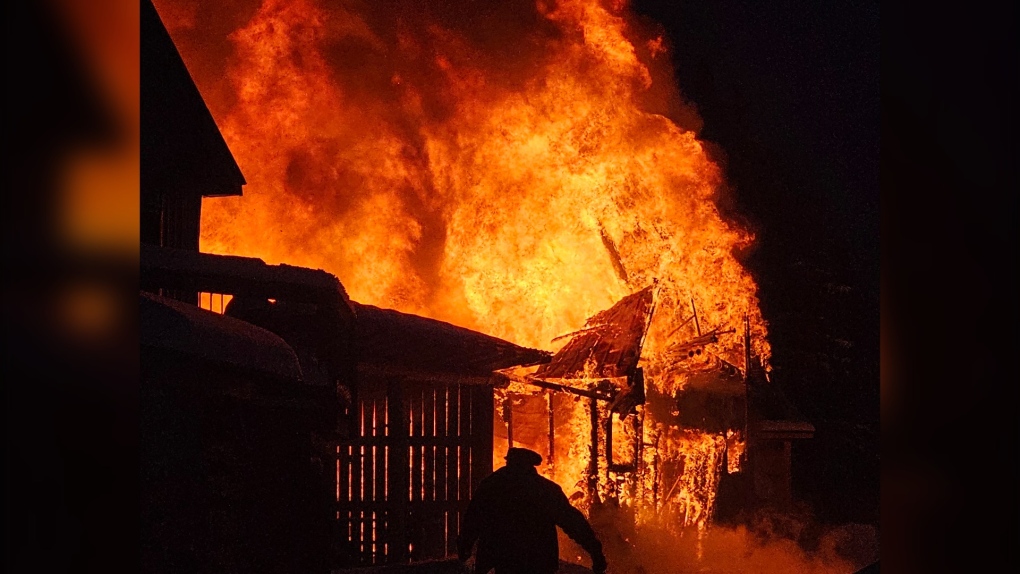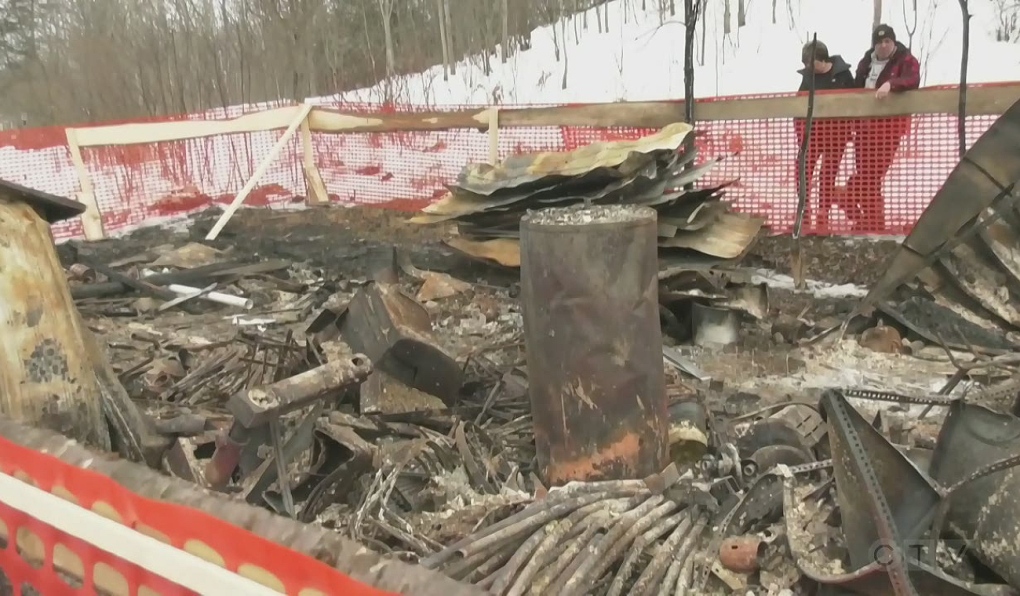Following devastating Sudbury fire, rural property owners urged to check on fire access
A recent fire in Greater Sudbury has brought to light some vital considerations for rural property owners.
Greater Sudbury Fire Services says that all fire services in Ontario have a municipal bylaw outlining the level of service provided to the community.
In Greater Sudbury, the bylaw says there are some areas of the city that fire services won’t be able to access to fight a fire.
Deputy Fire Chief Jesse Oshell said it’s vital that residents know whether fire trucks can make it to their property.
"Areas (with) impediments to access, topographical features that restrict our ability to respond, where there is potentially a road system that is not well-maintained, where there is water access only," Oshell said.
"Residents in the community that maintain properties where there may be a limitation or restriction certainly need to know."
 Maurice and Tracey Lalonde said no firefighters showed despite several 911 calls. Now, four outbuildings behind their century-old farm house are gone, including a garage and a gazebo. (Photo courtesy of Tracey Lalonde)
Maurice and Tracey Lalonde said no firefighters showed despite several 911 calls. Now, four outbuildings behind their century-old farm house are gone, including a garage and a gazebo. (Photo courtesy of Tracey Lalonde)
Oshell said fire services is equipped to handle most situations, and are unable to attend fires about once or twice a year.
"We have our high angle rope rescuers, we have water rescuers who respond in swift water, moving water, ice conditions, hazardous material response, as well," he said.
"We train our workers to recognize the hazards and respond to those situations."
If they can’t actually fight the fire, Oshell said firefighters must ensure occupants are safe.
"We ensure individuals are safe,” he said.
“After that point, it’s a matter of follow-up with insurance or property owners.”
Oshell said structural fires can be extremely dangerous and workers need access to trucks and equipment.
"Our protective gear is designed for that purpose, it’s not designed to be on, in or around moving water conditions or to be used when we're in rescue-type situations,” he said.
“So there's a lot of factors that go into determining what type of property or building fire service can or will be responded to.”
A few weeks ago, a couple in Beaver Lake were devastated when a fire destroyed four outbuildings on their property and firefighters did not arrive.
Tracey Lalonde's property is roughly 132 yards across the Vermillion River. She said she and her husband have taken multiple steps to ensure their property is safe, including insurance, purchasing a portable fire pump and an ice craft to ensure access.
 Tracey Lalonde's property is roughly 132 yards across the Vermillion River. She said she and her husband have taken multiple steps to ensure their property is safe, including insurance, purchasing a portable fire pump and an ice craft to ensure access. (File)
Tracey Lalonde's property is roughly 132 yards across the Vermillion River. She said she and her husband have taken multiple steps to ensure their property is safe, including insurance, purchasing a portable fire pump and an ice craft to ensure access. (File)
"We have the ability to get out regardless of the ice conditions. We had prepared ourselves for emergencies," Lalonde said.
"This one, unfortunately, got out of our control."
She said she hadn't heard of the bylaw until the fire.
"I wasn’t informed of the bylaw until post-fire,” Lalonde said.
“We had no idea about that. Having said that, it doesn’t change my feelings about the city.”
Make sure you're covered
She said she wants to help other homeowners any way she can to prevent them from being in her situation.
"Make sure you're covered for your property, whether you have road access or waterway like we are, it's very important to check your policy and make sure you have the coverages that are pertinent to what you have on your property," Lalonde said.
Anne Marie Thomas, director of consumer and industry relations with the Insurance Bureau of Canada, said there are three categories of home protection that revolve around access to a fire hydrant or a fire station.
Thomas said it’s important to find out the fire coverage situation whenever someone buys a property.
"Let your insurance company know -- or before you buy the property, find out what the protection is,” she said.
“Where's the nearest fire hall? What's the average response time?"
While she can't speak to Lalonde's case specifically, Thomas said a homeowner would typically be covered by insurance in such a situation.
"Typically, if there is a fire and the only reason it can't be put out is because fire can’t access the property for their own safety or whatever the reason, coverage should still apply," she said.
- Download our app to get local alerts on your device
- Get the latest local updates right to your inbox
Thomas said it's a similar situation when there is a wildfire.
"In a wildfire situation for example, it's too hot for fire to get to the residence,” she said.
“That would still be covered if the homeowner has an insurance policy.”
Thomas advised rural property owners to install a sprinkler system, clean up any debris on the property that could feed a fire, and look at potential areas around the home that could combust if a fire breaks out.
CTVNews.ca Top Stories

Canada crashes out of world juniors in quarterfinals for second straight year
Canada has been eliminated from the world junior hockey championship with a 4-3 loss to Czechia in the quarterfinals.
Pickering pausing in-person meeting due to alt-right threats, mayor says
Pickering Mayor Kevin Ashe says the city is pausing all in-person meetings, moving them to a virtual format, for the time being due to “alt-right” threats.
Athabasca 'chop shop' bust yields millions in stolen vehicles, heavy equipment: RCMP
RCMP have made what they call a "major recovery" of stolen property in Athabasca.
2 dead and 18 injured in Southern California plane crash
Two people died and 18 were injured Thursday when a small plane crashed through the roof of a sprawling furniture manufacturing building in Southern California where at least 200 people were working, police said.
Toys "R" Us Canada closing 5 stores, expand HMV and add play spaces to some shops
Toys 'R' Us Canada says it is closing five Ontario stores and revamping several others as it works to 'optimize' its business.
Wayne Osmond, singer and guitarist for The Osmonds, is dead at 73
Wayne Osmond, a singer, guitarist and founding member of the million-selling family act The Osmonds, who were known for such 1970s teen hits as 'One Bad Apple,' 'Yo-Yo' and 'Down By the Lazy River,' has died. He was 73.
Grieving orca mother Tahlequah carries dead baby for the second time
The famous mother orca who made waves around the world for carrying her dead calf for 17 days has suffered another tragic loss.
Former Liberal cabinet minister Marco Mendicino won't seek re-election
Marco Mendicino, a prominent Toronto member of Parliament and former minister of public safety and immigration, won't run in the next federal election, CTV News has learned.
U.S. soldier shot self in head before Cybertruck exploded outside Trump's Las Vegas hotel, officials say
The highly decorated U.S. army soldier inside a Tesla Cybertruck packed with fireworks that exploded outside Trump International Hotel in Las Vegas shot himself in the head just before detonation, authorities said Thursday.


































